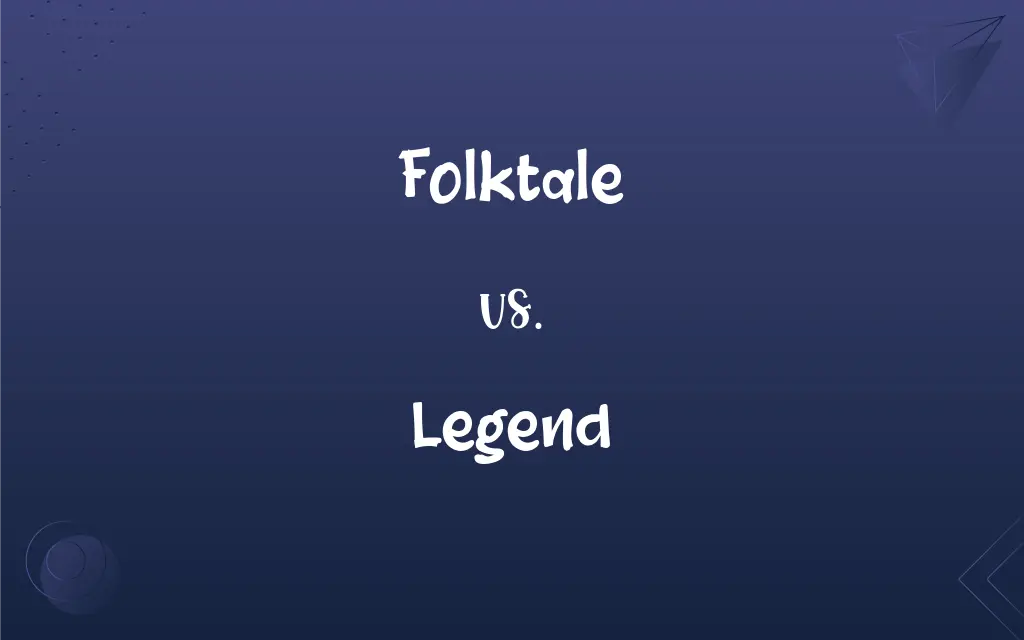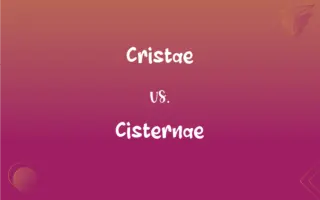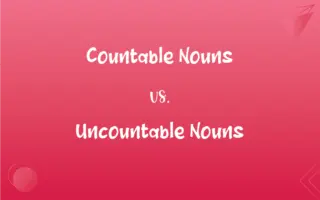Folktale vs. Legend: What's the Difference?
By Aimie Carlson & Harlon Moss || Published on December 8, 2024
Folktales are fictional stories passed down orally, often with moral lessons or entertainment, while legends are semi-true stories rooted in historical facts but embellished over time.

Key Differences
Folktales are a part of oral tradition, embodying the cultural values, morals, and fantasies of a community. They often include elements of magic, talking animals, and mythical beings, serving both entertainment and educational purposes. Folktales are not tied to any real events or locations, making them universally adaptable across cultures. Legends, on the other hand, are stories that have a basis in historical fact but are embellished over time. They revolve around real or supposedly real figures and events, with the narrative often enhancing the protagonist's heroic qualities or the event's significance. Legends serve to idolize historical figures, explain historical events, or convey moral messages.
Folktales are primarily fictional and aimed at entertaining or teaching lessons, legends blend this fiction with historical context, giving them a semblance of truth. This makes legends more specific to the culture or region from which they originate, as they often reference real places, events, or characters from history. Folktales, with their generic settings and timeless themes, can be found in many cultures with variations that reflect local beliefs and values.
The purpose of folktales often extends to explaining natural phenomena or social customs through allegory, using fictional narratives to impart wisdom or morals. Legends, meanwhile, may serve to reinforce societal values, but they do so by elevating historical figures to mythical status, thereby linking the past with moral and ethical lessons relevant to the present.
Despite their differences, both folktales and legends play crucial roles in preserving the cultural heritage and collective memory of communities. They are vehicles for passing down traditions, values, and beliefs from one generation to the next, albeit through different narrative structures and emphasis on historical accuracy versus moral or fantastical storytelling.
Comparison Chart
Basis
Fictional, no historical basis
Semi-true, rooted in historical events
ADVERTISEMENT
Characters
Mythical beings, animals, ordinary humans
Historical figures, heroes
Setting
Generic, not specific to any real place
Often specific to real places and times
Purpose
Entertainment, moral lessons
Idolize heroes, explain events, moral messages
Cultural Specificity
Universal themes, adaptable across cultures
Specific to culture or region, referencing real history
Folktale and Legend Definitions
Folktale
Folktales are stories with moral lessons featuring animals or mythical creatures.
The Tortoise and the Hare teaches the value of perseverance.
ADVERTISEMENT
Legend
Legends are specific to a culture or region, reflecting its history.
The Japanese legend of the samurai Minamoto no Yoshitsune.
Folktale
They are part of the oral tradition, passed down through generations.
Many cultures have their version of the Cinderella story.
Legend
They often focus on heroes or significant historical events.
The legend of Robin Hood centers on a heroic outlaw fighting injustice.
Folktale
Folktales often include elements of magic or the supernatural.
Jack and the Beanstalk features magic beans and a giant.
Legend
Legends explain historical events or phenomena with embellishment.
The legend of the Trojan War combines historical siege with mythical stories.
Folktale
They are not tied to historical events or real people.
Folktales like The Three Little Pigs focus on moral lessons rather than history.
Legend
Legends are stories that mix historical facts with fiction.
The legend of King Arthur includes historical elements and mythical aspects like Excalibur.
Folktale
Folktales serve to entertain and teach societal values.
Little Red Riding Hood teaches the importance of caution.
Legend
They aim to idolize historical figures and convey moral messages.
The legend of George Washington and the cherry tree promotes honesty.
Folktale
A story or legend forming part of an oral tradition.
Legend
An unverified story handed down from earlier times, especially one popularly believed to be historical.
Folktale
A tale or story that is part of the oral tradition of a people or a place.
Legend
A body or collection of such stories.
Folktale
A tale circulated by word of mouth among the common folk, especially one forming part of the tradition of a culture.
Folktale
A tale circulated by word of mouth among the common folk
FAQs
Are legends considered true stories?
Legends contain a kernel of truth or historical fact, but they are largely embellished and not entirely accurate historically.
Why are folktales important in cultural heritage?
Folktales are crucial for preserving oral traditions, showcasing cultural values, and teaching morals to younger generations in an accessible form.
How do folktales and legends serve their communities?
Both serve to entertain, teach moral lessons, and preserve cultural values, but legends also connect communities to their historical roots.
What role do legends play in history?
Legends offer insight into how communities view their heroes and significant events, blending historical memory with cultural ideals.
What differentiates a folktale from a legend?
Folktales are entirely fictional and often fantastical, while legends are rooted in historical events but embellished with fictional details.
How do modern interpretations affect folktales and legends?
Modern interpretations can adapt these stories to contemporary values and mediums, ensuring their relevance and survival across generations.
Why do some legends withstand the test of time better than others?
Legends that strongly resonate with a community's values, identity, and historical experiences are more likely to be retold and preserved.
How do folktales and legends adapt to changing societies?
As societies evolve, folktales and legends often undergo transformations to reflect current values, norms, and sensibilities, ensuring their relevance and ability to resonate with new generations.
What role does language play in the tradition of folktales and legends?
Language not only shapes the telling of folktales and legends but also preserves the unique idiomatic expressions, proverbs, and linguistic nuances of a culture, adding depth and authenticity to these narratives.
How do folktales differ globally?
While folktales share universal themes, their characters, settings, and motifs often reflect the unique geography, culture, and social norms of their origins, leading to a rich diversity of stories worldwide.
Can a folktale become a legend?
While folktales and legends are distinct, elements of folktales may be incorporated into legends as they are retold and gain historical or heroic significance.
Can the same story be a folktale in one culture and a legend in another?
Yes, depending on the cultural context and historical significance attributed to the story, its classification can vary between cultures.
Are there any universal themes in folktales and legends?
Universal themes like heroism, morality, and the triumph over adversity appear in both folktales and legends across different cultures.
What is the future of folktales and legends in a globalized world?
In a globalized world, folktales and legends have the potential to foster cross-cultural understanding and appreciation, as they are shared, adapted, and celebrated across borders, highlighting the universal qualities that unite different cultures.
What challenges do folktales and legends face in the modern world?
In the digital age, folktales and legends compete with a multitude of entertainment and information sources, risking dilution or loss of cultural specificity and the oral tradition's intimate nature.
What impact do folktales and legends have on literature and film?
Folktales and legends have significantly influenced literature and film, providing foundational narratives, archetypes, and themes that are continually reinterpreted in novels, movies, and other forms of media.
What is the significance of storytelling in preserving folktales and legends?
Storytelling is crucial for the preservation of folktales and legends, serving as a dynamic medium that allows for the adaptation and evolution of these stories, ensuring they continue to educate, entertain, and instill cultural values.
Can modern technology help in preserving folktales and legends?
Yes, modern technology, including digital archiving, multimedia storytelling, and social media, plays a significant role in preserving and disseminating folktales and legends to wider, more diverse audiences.
How do educators use folktales and legends?
Educators use folktales and legends to teach moral lessons, cultural awareness, and critical thinking skills, often employing these stories to engage students with universal themes through the lens of diverse cultures.
How do folktales and legends contribute to a sense of identity?
These stories play a key role in shaping communal and individual identities, connecting people to their cultural heritage, ancestors, and the collective wisdom of their community.
About Author
Written by
Aimie CarlsonAimie Carlson, holding a master's degree in English literature, is a fervent English language enthusiast. She lends her writing talents to Difference Wiki, a prominent website that specializes in comparisons, offering readers insightful analyses that both captivate and inform.
Co-written by
Harlon MossHarlon is a seasoned quality moderator and accomplished content writer for Difference Wiki. An alumnus of the prestigious University of California, he earned his degree in Computer Science. Leveraging his academic background, Harlon brings a meticulous and informed perspective to his work, ensuring content accuracy and excellence.






































































